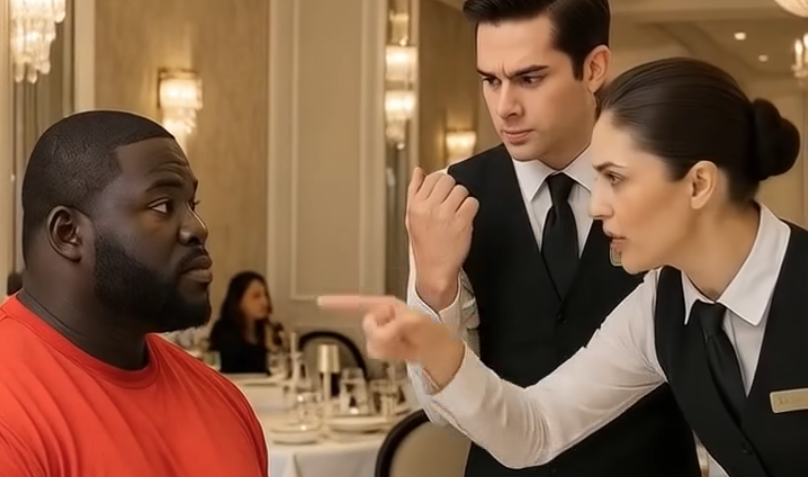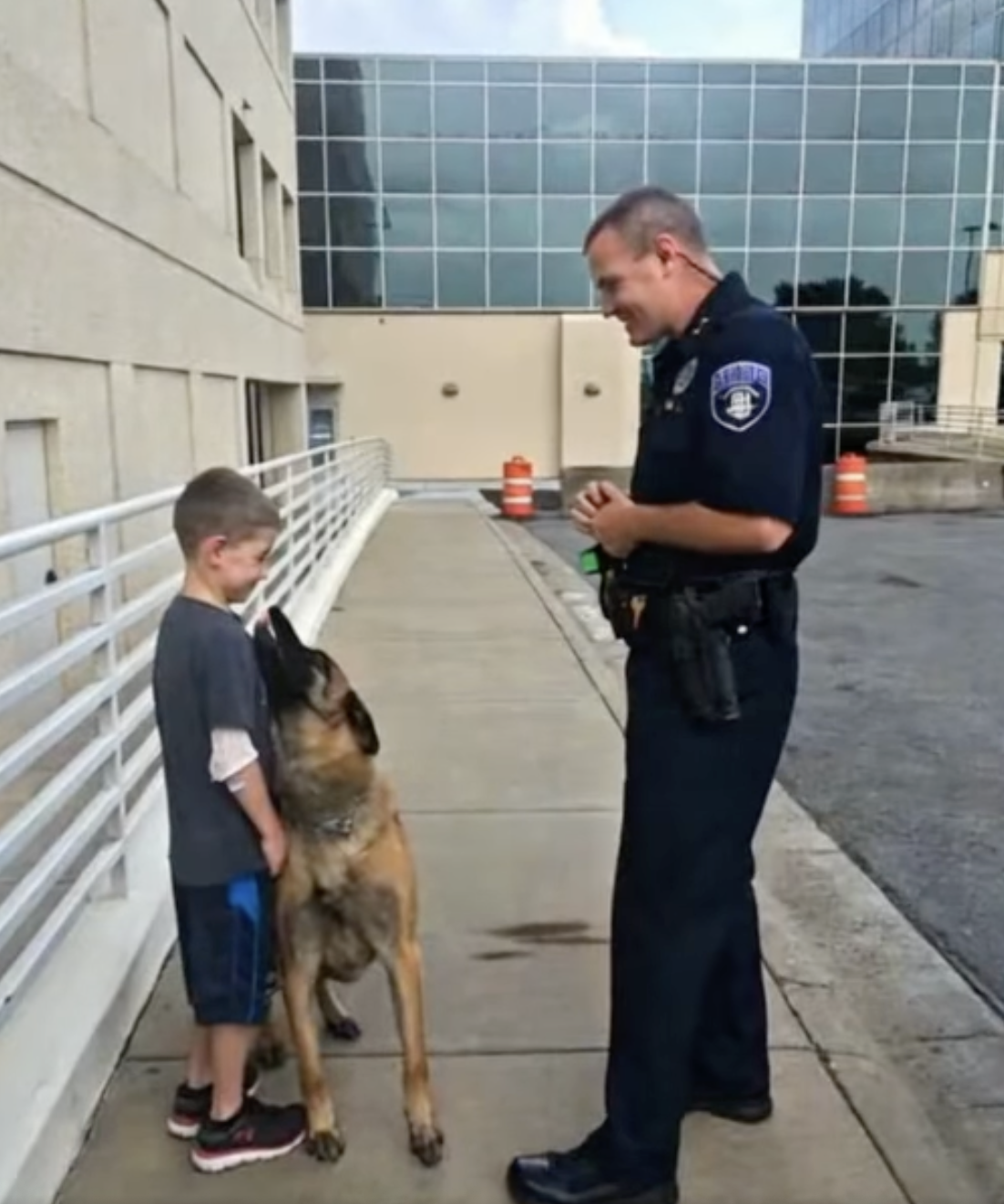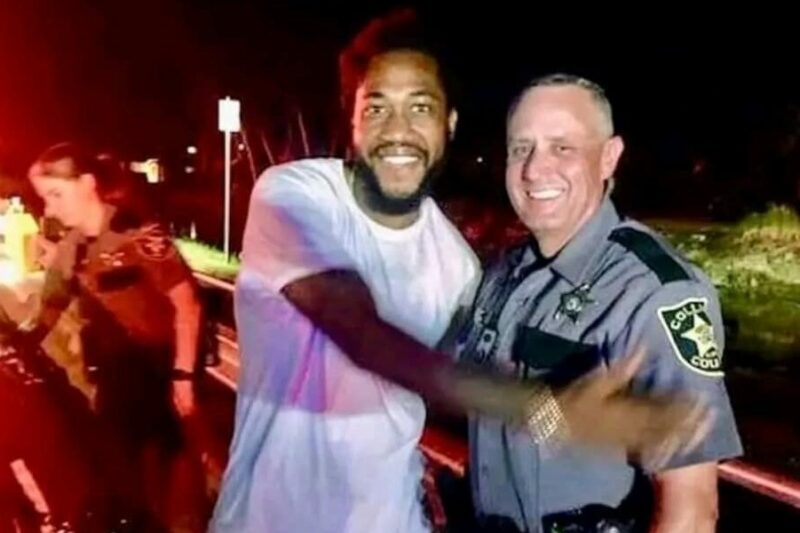On a quiet afternoon, Miller’s Diner, a modest roadside stop along Pennsylvania’s Interstate 95, welcomed the golden glow of late sunlight through its worn blinds. The air carried the scent of fried onions, strong coffee brewed too long, and the quiet weight of unfulfilled dreams. Truck drivers stopped for quick bites, locals exchanged familiar stories, and the rhythm of life moved softly, almost unseen.
In a corner booth, a tall man in a faded sweatshirt sat with a calm presence, his eyes scanning the menu with a hunger born of need rather than interest. His jeans and sneakers showed signs of wear, but his expression gave nothing away. To the staff, he appeared as another weary traveler, perhaps scraping by, hoping to make a few dollars last in a place where even coffee refills came with a price.
The waitress approached, her tone sharp and cutting.
“We don’t serve folks who can’t pay,” she declared loudly, her words pulling curious glances from nearby tables.
The regulars knew her as Karen, her name tag gleaming under the diner’s fluorescent lights, her smile reserved for those who tipped well.
The man lifted his gaze, steady and piercing, casting a hush over the diner. A trucker coughed awkwardly; a young mother drew her child closer. Miller’s was a place of routine, not confrontation, yet Karen’s words had sparked something unexpected.
He said nothing at first, folding the menu with deliberate care, each movement precise, as if he’d learned to guard his emotions tightly.
Karen, misreading his silence, leaned closer, her voice laced with scorn.
“You heard me. If you can’t afford to eat, you don’t belong here.”
From the kitchen window, Eddie, the cook, peered out. Recognition flashed in his eyes, but he hesitated. This was no ordinary drifter. Eddie’s thoughts raced— he’d seen this man before, not in this humble diner but in a far grander setting. Perhaps on a screen, speaking to crowds, his voice filling auditoriums, not roadside stops.
Karen didn’t know she was addressing Shaquille Johnson, known as “Big Shaq,” a former college basketball star and humanitarian. He had built programs to feed hungry children across the state, funded scholarships for students from struggling neighborhoods, and dedicated his life to proving that everyone deserves a seat at the table, no matter their appearance or past.
Yet here, he was dismissed as too poor to dine.
The diner grew tense, whispers rippling among the customers. Big Shaq leaned back, his voice even and clear.
“Is this how you greet everyone who doesn’t match your expectations?”
The moment would echo in the town for years, though no one in the diner could have predicted it then.
Karen folded her arms, her eyes rolling, ready to fire back. Before she could, Eddie stepped out from the kitchen, wiping his hands on a stained apron, his voice carrying nervous authority.
“Karen, stop. Do you even know who you’re talking to?”
The room stilled. Karen’s brow furrowed, confused.
“It doesn’t matter who he is. He looks broke. We’ve got bills to pay. People like him don’t tip.”
Her words landed like a misstep, heavy and wrong.
From a nearby table, Linda, a retired schoolteacher, spoke up, her voice firm.
“You should be ashamed. I know this man. He funded the computer lab at our middle school. My grandson learned to code because of him.”
Karen’s face flushed, but she doubled down.
“I don’t care if he built the White House. If he’s not ordering, he’s loitering. Management will back me up.”
Eddie shook his head, his tone resolute.
“No, they won’t.” His respect for Big Shaq was unmistakable. “Sir, I’m sorry. Come back anytime. Your meal’s on me.”
Shaq raised a hand, calm but firm.
“I don’t need handouts. I came here for the apple pie—heard it’s the best on this road. I’d pay double if it’s as good as they say. But what I see here…” He paused, his words hanging in the air. “…is uglier than an empty plate.”
Silence settled, heavy and thick. Karen shifted uncomfortably but held her ground, offering no apology.
From a back booth, a trucker named Ray stood, his linebacker frame commanding attention, his hands stained with grease, his voice deep like the rumble of his rig.
“You messed up, lady. This man’s done more good than you’ll ever know. I saw him on the news, helping rebuild homes after that Florida hurricane. You’re telling me he doesn’t deserve a slice of pie?”
Karen muttered something inaudible, but the mood had shifted. Customers murmured in agreement, the energy in the room turning. Phones emerged, capturing photos and videos. What unfolded at Miller’s Diner was no longer contained within its walls—it was about to spill into the world.
Big Shaq rose slowly.
“I’m not here for trouble. I came for respect, which costs nothing. Kindness doesn’t keep a ledger. Think about that.”
He placed a crisp $100 bill on the table, though he’d ordered nothing, and walked out.
The diner buzzed. Customers stared at Karen, some shaking their heads, others muttering disapproval. Eddie struck the order bell in frustration.
“You chased away the best story this place ever had.”
But the story was far from over.
By morning, Miller’s Diner was trending online. A shaky cellphone video of Big Shaq’s measured response spread across Facebook, Twitter, and TikTok, captioned: “Waitress shames philanthropist—he answers with dignity.” Thousands shared it within hours.
News vans lined up across the street, reporters interviewing witnesses. The small diner off the highway had become a national story—not one it would have chosen.
Karen became the unwitting center of the controversy. Regulars who once overlooked her sharpness now avoided her section. Management faced a deluge of angry emails, some calling for her dismissal, others sharing stories of Shaq’s generosity. Threats of boycotts followed.
Shaquille Johnson stayed silent. He refused to vilify someone he saw as misguided, not malicious. Instead, he quietly donated a significant sum to the town’s food bank, directing it to support single mothers and struggling families. His grace, set against Karen’s judgment, made his actions shine brighter.
Eddie spoke to a news camera, his weathered face steady.
“You never know who’s walking through that door. Could be a millionaire, could be someone with only enough for a coffee. Hunger doesn’t care about your wallet. It just wants a meal.”
Linda, ever the teacher, sparked a broader conversation. She organized a town library meeting where parents, teens, and residents discussed the incident and its deeper meaning—a reflection on a culture quick to judge and slow to understand.
Karen, at first defensive, blamed “cancel culture” for the backlash, insisting her reaction was overblown. But as the diner grew quieter and her shifts dwindled, reality sank in. She posted a shaky video apology, her voice strained, her pride bruised.
“I was wrong. I judged someone I didn’t know. I forgot respect is something you give, not something you earn.”
The apology didn’t erase the damage, but it allowed some in the community to move forward.
A month later, Shaq returned to Miller’s Diner. No cameras, no fanfare—just a man hungry for pie. Eddie greeted him with a firm handshake, and Linda offered a warm smile. Karen had resigned the week before.
Shaq ordered the apple pie, took a bite, and nodded.
“Now that’s worth paying double for,” he said softly, slipping another $100 bill under the plate.
His visit left a lasting mark. In a world shaped by assumptions and divisions, a single act of kindness—or cruelty—can ripple far. Sometimes, quiet dignity in the face of disdain speaks louder than any argument.




